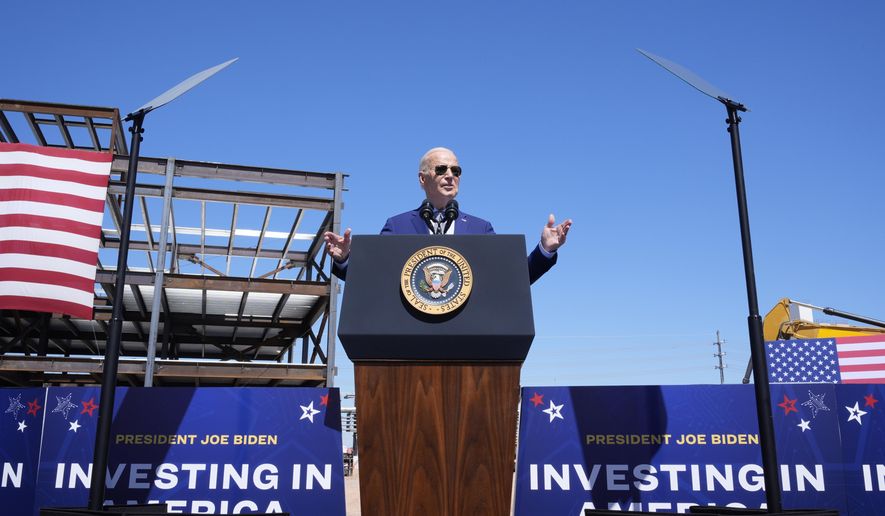President Biden is employing a tried and true tactic to win over voters in Arizona: Shower them with taxpayer-funded goodies and attention.
Pressing the traditional levers of incumbency, the 81-year-old’s administration is looking to gain ground on former President Donald Trump by spending more money.
“In a state where it could be a razor-thin margin, of course his avalanche of attention could make a substantial difference,” said Arizona-based Republican strategist Jason Rose. “It is almost like Arizona has become his second Delaware with all the attention he has given it.”
Mr. Biden has directed billions of dollars to the state’s growing semiconductor chip industry. Billions more have gone toward improving roads and bridges and expanding internet access. Tens of millions more have been set aside to help build an 83,000-square-foot library honoring the late Sen. John McCain.
Plus, he established a new national monument in the Grand Canyon protecting ancestral land sacred to American Indian tribes.
Mr. Biden is following in the footsteps of previous presidents who have relied on election-year spending marathons to buy the goodwill of voters.
SEE ALSO: Biden goes all in with labor unions, but rank-and-file workers remain skeptical
Indeed, Mr. Trump often tells voters he doled out tens of billions of dollars to farmers across the Midwest. During a campaign rally in Wisconsin this month, Mr. Trump took credit for awarding a multibillion contract to a shipbuilding company to build a new Navy frigate.
“I got you so many contracts, including that big shipping contract. You remember that one?” Mr. Trump said.
The strategy has a downside, said Chris Edwards of the Cato Institute, a libertarian-leaning think tank in Washington.
“Electoral-driven spending turns off as many people as it may attract,” Mr. Edwards said. “That is, obvious efforts to buy votes turn people off.
“For example, Biden’s continuing efforts to attract young voters with college debt forgiveness turns off far more younger- and middle-aged voters who’ve already paid off their own student debt,” he said. “What many politicians don’t seem to realize is that big spending signals profligacy to voters, which turns off half the public who are frugal-minded.”
For his part, Mr. Biden is betting the reward of bringing the federal love outweighs the risk, particularly in a state he won by less than 11,000 votes in 2020 and where this year its voters could swing the presidential election and tip control of the Senate.
Mr. Biden this month announced a $6.6 billion preliminary agreement to support the construction of “leading-edge semiconductor manufacturing facilities” in northern Phoenix and a separate multibillion public-private partnership with Intel for up to $8.5 billion to help construct a new computer chip plant in Arizona.
Funded with money from the CHIPS Act that Arizona’s Republican delegation opposed, the projects are part of the administration’s push to convince voters that manufacturing jobs are returning thanks to his spending and tax incentives.
“You’re going to be building the future here in Arizona,” Mr. Biden said last month in Chandler, a city of 280,000 people about 20 miles southeast of Phoenix.
The state has received almost $8 billion from the bipartisan infrastructure deal and $83 million from the American Rescue Plan — which the Arizona GOP delegation also opposed — for the McCain Library at a time when Republicans in the state are torn over McCain’s decadeslong legacy of service.
Vice President Kamala Harris has visited the state to criticize Republicans over their policies on abortion.
Despite all that, Stan Barnes, another Arizona-based GOP strategist, said he does not think it will do much to move the needle in the current political environment.
“I don’t think they are getting the requisite political support for all the money spent because it is all a subset of: Do you or do you not like Donald Trump, or do you or do you not think Joe Biden is a horrible, corrupt president,” Mr. Barnes said.
“If this was the 1970s, 1980s or 1990s and the federal government passed a law that caused all these things to happen, I think it would be a significant mover of voters in Arizona,” he said. “Today it is part of the noise in the background compared to individuals and their feelings about these two men.”
• Seth McLaughlin can be reached at smclaughlin@washingtontimes.com.




Please read our comment policy before commenting.